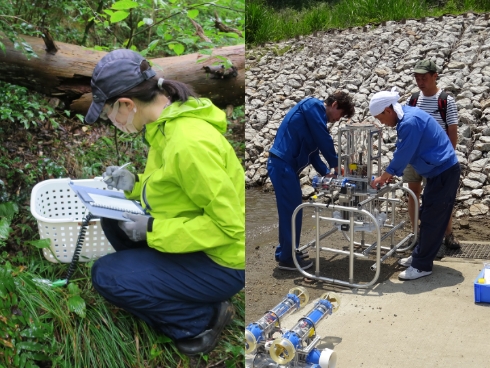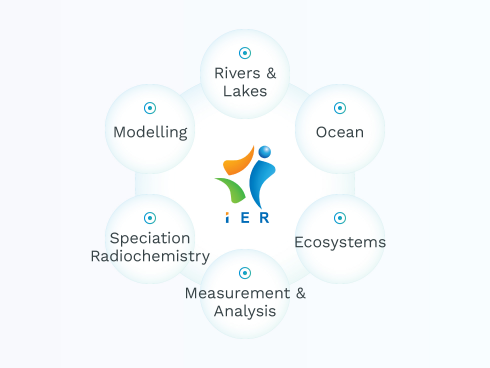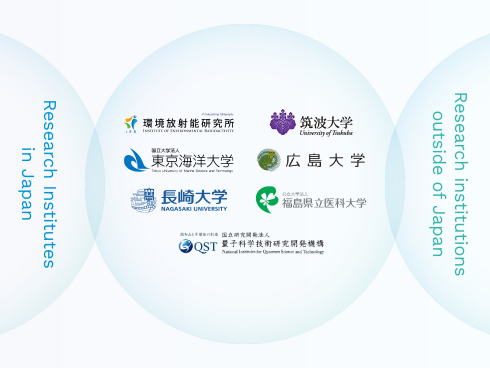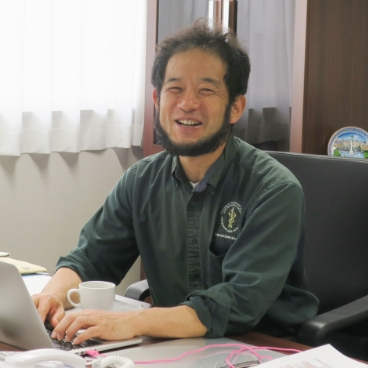About us
The IER’s AimsClarify the dynamics and impacts of environmental radioactivity derived from the nuclear accident and share our knowledge with the world

Institute of Environmental Radioactivity (IER) at Fukushima University was established on July 1, 2013, prompted by the Tokyo Electric Power Company Fukushima Daiichi Nuclear Power Plant accident. It has become an international challenge to understand how radioactive substances released by accidents at facilities such as nuclear power plants behave in and impact the environment. We believe that it is our responsibility to share the experiences and lessons learned from the accident with international community, and to engage in long-term research activities.
Our Research
Conduct cross-disciplinary project research

The IER is organized into 5 divisions and 15 research units, and has developed six multi-disciplinary projects that cross and integrate these fields and units to conduct basic and applied research of radionuclide behavior in the environment, including forests, rivers, lakes, and the oceans.
Joint research with other institutions

The IER, jointly managed by University of Tsukuba, Tokyo University of Marine Science and Technology, Hiroshima University, Nagasaki University, Fukushima Medical University, and Quantum Medical Science Directorate of National Institutes for Quantum and Radiological Science and Technology, aims to become a leading-edge research center in the field of environmental radioactivity through collaboration with domestic and international research institutions.
A Message from Our DirectorSupport for reconstruction of Fukushima and global utilization of the Fukushima experience through environmental research.

The Institute of Environment and Radioactivity (IER) at Fukushima University was established in July 2013 in response to the TEPCO Fukushima Daiichi Nuclear Power Plant accident in March 2011. The IER has also been a part of Environmental Radioactivity Research Network Center (ERAN) since 2018. We conduct research in the field of environmental dynamics of radioactivity and radiation effects in Fukushima, promote joint research with domestic and international researchers, and is engaged in human resource development through graduate education in the major of Environmental Radioactivity.
The IER investigates the dynamics of radionuclides due to water and atmospheric transport and biological process in ecosystems in various segments of the Earth’s surface are targeted including the atmosphere, land, hydrosphere, and oceans. By doing so, IER aims to elucidate changes in radiation levels and the concentration of radioactivity in plants, animals, and other organisms, thereby contributing to the confirmation of environmental and food safety, the long-term recovery of Fukushima, and the promotion of agriculture, forestry, and fisheries. We believe that communication with local residents is important, as local environmental radioactivity issues can be a catalyst for new research.
Environmental radioactivity research can also be useful in nuclear disaster prevention and post-disaster response, and as seen in the SATREPS Chornobyl project, which was led by the IER and implemented for six years, support can be provided to other places, both domestic and international, where new research can also be generated.
Given the dependence of human life on air and water from the flow of materials on the earth, and on plants and animals as food, the scientific knowledge provided by environmental radioactivity research is key to the goal of “sustainability” of human activities and to understanding and solving global environmental problems. Research on radiation effects on wild plants and animals may also provide clues that go beyond the presence or absence of radiation effects to the mechanisms of living organisms.
We will conduct research with a view to solving issues after the nuclear power plant accident in Fukushima, applications to disaster prevention in Japan and abroad, and solutions to global environmental problems. Through these efforts, we aim to promote regional development and distinctive graduate school education. We look forward to your continued support and cooperation.
NANBA Kenji
Director , the Institute of Environmental Radioactivity, Fukushima University
History
- 2011 March
Great East Japan Earthquake and TEPCO Fukushima Daiichi Nuclear Power Plant accident occurred.
- 2012 August
The first meeting of the Establishment Preparation Committee
- 2013 March
Subsidy for enhancing and promoting national university reform approved by the Ministry of Education, Cultures, Sports, and Technology
- 2013 July
Establishment of Institute of Environmental Radioactivity, Completion of Analytical Building
- 2017 Feb
Completion of the Main Building and Storage Building of IER
- 2018 June
Approved as a Joint Use/Research Center “Environmental Radioactivity Research Network Center (ERAN)”
- 2018 August
Approval for Establishment of Graduate School (Master’s Program)
- 2019 April
Joint Usage / Research Center “ERAN” launched (until March 31, 2020) Establishment of Master’s Program
- 2020 July
Approval for Establishment of Graduate School (Doctoral program)
- 2021 April
Establishment of Doctoral Program
IER Pamphlet
Introduction Movie of IER
Donations to the IER
The IER is asking for your donation to help us grow as a research institute that contributes to Fukushima, Japan, and the world by promoting research activities in cooperation with domestic and international researchers in the hope that a safe and secure environment will return to Fukushima once again.
It has become an international challenge to understand how radioactive substances released by accidents such as the Fukushima Daiichi Nuclear Power Plant accident of 2011 and the Chernobyl Nuclear Power Plant accident of 1986 behave in and impact the environment. We believe that it is our responsibility to share the experiences and lessons learned from the accident with international community, and to engage in long-term research activities.
The IER has developed six multi-disciplinary projects and conducted research activities. For more details, please refer to our pamphlet which summarizes our research activities in an easy-to-understand manner with photos and charts. We look forward to your continued support.
Procedure for Donation
Please contact the office of the Institute Environmental Radioactivity.
Inquiries / Mailing Address about Donations
【Contact】 Office of The Institute of Environmental Radioactivity / TEL: +81 024 504 2848
【Address】1 Kanayagawa, Fukushima City, Fukushima Pref. 960-1296
